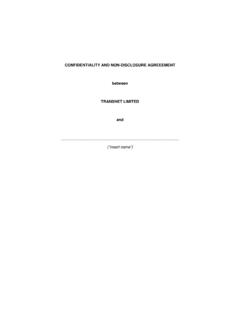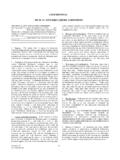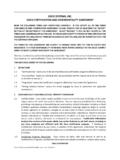Transcription of Protecting the Protecting Confidentiality of …
1 Protecting THE Confidentiality OF DISPUTE resolution PROCEEDINGS A GUIDE FOR FEDERAL WORKPLACE ADR PROGRAM ADMINISTRATORS Interagency ADR Working Group Steering Committee April 2006 2 INDEX Page Introduction 3 Chapter I Dispute resolution Proceedings A. Overview 5 B. Oversight Responsibilities Before the Dispute 21 resolution Session C. Oversight Responsibilities During the Dispute 26 resolution Session D. Oversight Responsibilities After the Dispute 30 resolution Session Chapter II Confidentiality Agreements 33 Chapter III Agency Record-Keeping 38 Chapter IV Evaluation of ADR Programs and Processes 44 Chapter V Requests for Disclosure of Dispute resolution 47 Communications Chapter VI Non-Party Participants in the Dispute resolution 60 Session.
2 Spouses, Family Members, Friends, and Union Representatives Appendix Chapter Summaries 64 3 INTRODUCTION The Steering Committee of the Federal Interagency Alternative Dispute resolution Working Group (IADRWG)1 issues this Guide for use by administrators of workplace alternative dispute resolution (ADR) programs within federal government departments and agencies. Its primary purpose is to provide practical guidance on the application of the Confidentiality provisions of the Administrative Dispute resolution Act of 1996 ( the ADR Act ; 5 574) to federal workplace dispute resolution . Others, including administrators of other ADR programs, ADR professionals and anyone interested in ADR, may also find the information contained in the Guide to be valuable when ADR Act Confidentiality applies to their practice.
3 This Guide encourages the integration of the ADR Act and its legislative intent with agency policy and practice. The Guide is not regulation or policy and is not legally enforceable. The Guide is intended to provide helpful advice on potentially difficult questions, to executive branch ADR program administrators engaged in workplace ADR. 2 This Guide focuses solely on Confidentiality related to the use of mediation in federal workplace disputes . Confidentiality under the ADR Act may apply also to other ADR processes used to address workplace disputes , such as facilitation, conciliation and use of ombuds. ADR program administrator is the term used throughout this Guide to define the individual or individuals in an agency responsible for implementing procedures that allow parties to use ADR. The ADR program administrator s role differs from agency to agency. This is a full-time role in some offices, while in other offices, this is a part-time position.
4 In some agencies and departments the ADR program administrator focuses solely on ADR policy and implementing procedures. In these instances, the program administrator is not a neutral in terms of the Confidentiality provisions of the ADR Act. In other agencies and departments, the ADR program administrator is involved in assisting parties in resolving the dispute by serving as the mediator or advising the mediator. In these instances, the program administrator may be a neutral. This Guide extends the guidance issued by the Attorney General s Federal ADR Council, Report on the Reasonable Expectations of Confidentiality Under the Administrative Dispute resolution Act of 1996, 65 Federal Register 83085, December 29, 1 The Federal Interagency ADR Working Group was established in 1998 by Congress and the President to coordinate, promote, and facilitate the effective use of ADR in the government, pursuant to the Administrative Dispute resolution Act of 1996 and a White House Presidential Memorandum.
5 2 This Guide applies to the internal management of the civilian executive branch. It is not intended to create any right or benefit, substantive or procedural, enforceable at law or in equity, by a party against the United States, its agencies, its officers or any other person. It is intended to be relied upon as a source of constructive suggestions for the effective administration of agency workplace ADR programs, but is not to be accorded deference as an agency interpretation. Questions regarding interpretations of applicable law, regulation and policy should be raised with the appropriate legal counsel in each department and agency. 42000 ( the 2000 ADR Guidance ), which may be found at the , the IADRWG website. It should be used in concert with the Confidentiality provisions of the ADR Act as well as agency Confidentiality policies and guidance. Another useful resource on this topic for ADR program administrators and general counsel staff is the Guide to Confidentiality Under the Federal Administrative Dispute resolution Act, published by the American Bar Association ("the 2005 ABA Guidance").
6 Congress enacted the ADR Act to encourage and support the use of ADR within the federal government. The provisions of the ADR Act establish requirements regarding the Confidentiality of communication during ADR processes involving federal agencies. These requirements attempt to balance the goals of open government with the need to protect the assurance of Confidentiality necessary to encourage free communications within the ADR process. Some of these requirements may differ from the Confidentiality provisions under which private practitioners function. This is because various state laws provide different Confidentiality protections affecting private neutrals. Confidentiality is a critical component of a successful ADR process. Guarantees of Confidentiality allow parties to freely engage in candid, informal discussions of their interests to reach the best possible settlement of their dispute.
7 A promise of Confidentiality allows parties to speak openly without fear that statements made during an ADR process will be disclosed to others. Confidentiality also can reduce posturing and destructive dialogue among parties during the resolution process. It is essential that neutrals and parties be informed of the Confidentiality protections available under the ADR Act and of the limitations to that protection. An ADR program administrator should take the steps necessary to assure that both internal and external neutrals understand the Confidentiality provisions that apply to federal ADR programs and that parties are adequately informed of these provisions. Each chapter of the Guide includes a description and discussion of the issues, a legal analysis, and questions and answers related to Confidentiality as it pertains to an aspect of a workplace ADR program. The first chapter discusses issues important to remember throughout a dispute resolution proceeding .
8 This chapter covers the various stages before, during, and after the actual dispute resolution session of a dispute resolution proceeding . The remaining five chapters discuss particular issues regarding Confidentiality , Confidentiality agreements, record-keeping, program evaluation, access requests, and non-party participants. Effort has been taken to minimize repetition of legal analysis and guidance within the chapters of this Guide; however, such repetition has not been removed where the same material is critical to the understanding of multiple issues addressed. In most instances, reference is made to the relevant passage in another chapter where the issue in question is addressed in greater detail. 5 CHAPTER I DISPUTE resolution PROCEEDINGS A. OVERVIEW This chapter provides advice for ways ADR program administrators can establish procedures and practices to maintain appropriate Confidentiality during the various stages of a dispute resolution proceeding ( , intake, assessment, convening, dispute resolution session, authority clearance and agreement implementation).
9 General Description The requirement to maintain the Confidentiality of information received by an ADR program depends primarily on whether an ADR program administrator, a member of his/her staff, a volunteer, a collateral-duty person and/or an outside contractor may be deemed a neutral for purposes of the particular dispute resolution proceeding . If so, the neutral must with few exceptions maintain the Confidentiality of information obtained or generated on behalf of parties they assist during the dispute resolution proceeding . As discussed later, the role of a neutral used to support the mediation of federal workplace disputes may take several forms, including intake staff, convenors, assessors and mediators. The responsibilities of an ADR program administrator include identifying appropriate neutrals, understanding the extent of their obligation to maintain Confidentiality , ensuring that neutrals are trained in and understand their responsibilities related to Confidentiality , and providing support to the neutrals so that they can maintain this Confidentiality .
10 The 2000 ADR Guidance encourages agencies to establish policies and practices that support the terms and legislative intent of the ADR Act. Legal Analysis The following are terms and concepts used throughout this Guide. Additional legal analysis will be provided as it is relevant to individual chapters. A dispute resolution proceeding is a process in which: an alternative means of dispute resolution is used to resolve an issue in controversy; a neutral is used; and specified parties participate. 6A dispute resolution proceeding encompasses multiple stages, including intake, assessment, convening, the ADR session and activities necessary to execute a final settlement agreement between the parties (5 571(6)). A dispute resolution communication is any oral or written communication prepared for the purposes of a dispute resolution proceeding . The ADR Act states specifically, however, that a written agreement to enter into a dispute resolution proceeding or a final written agreement is not a dispute resolution communication.




